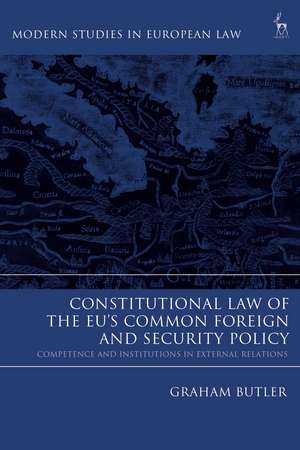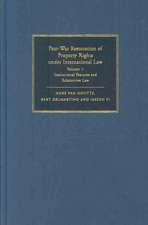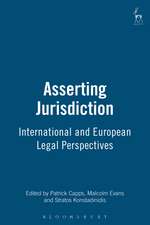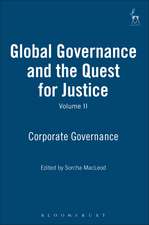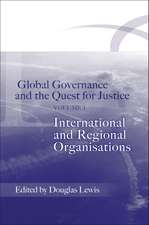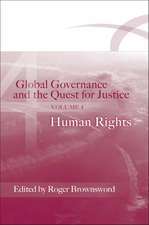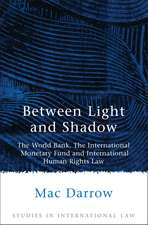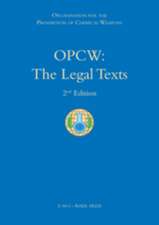Constitutional Law of the EU’s Common Foreign and Security Policy: Competence and Institutions in External Relations: Modern Studies in European Law
Autor Graham Butleren Limba Engleză Paperback – 19 mai 2021
| Toate formatele și edițiile | Preț | Express |
|---|---|---|
| Paperback (1) | 315.25 lei 43-57 zile | |
| Bloomsbury Publishing – 19 mai 2021 | 315.25 lei 43-57 zile | |
| Hardback (1) | 572.80 lei 22-36 zile | |
| Bloomsbury Publishing – 2 oct 2019 | 572.80 lei 22-36 zile |
Din seria Modern Studies in European Law
- 30%
 Preț: 575.75 lei
Preț: 575.75 lei - 24%
 Preț: 440.21 lei
Preț: 440.21 lei - 31%
 Preț: 594.77 lei
Preț: 594.77 lei - 30%
 Preț: 570.22 lei
Preț: 570.22 lei -
 Preț: 181.55 lei
Preț: 181.55 lei - 30%
 Preț: 541.93 lei
Preț: 541.93 lei - 30%
 Preț: 507.97 lei
Preț: 507.97 lei - 30%
 Preț: 790.77 lei
Preț: 790.77 lei - 34%
 Preț: 509.45 lei
Preț: 509.45 lei - 30%
 Preț: 511.64 lei
Preț: 511.64 lei - 19%
 Preț: 296.91 lei
Preț: 296.91 lei - 30%
 Preț: 571.34 lei
Preț: 571.34 lei - 19%
 Preț: 296.72 lei
Preț: 296.72 lei - 11%
 Preț: 375.73 lei
Preț: 375.73 lei - 30%
 Preț: 539.57 lei
Preț: 539.57 lei - 30%
 Preț: 595.65 lei
Preț: 595.65 lei - 27%
 Preț: 475.10 lei
Preț: 475.10 lei - 30%
 Preț: 572.80 lei
Preț: 572.80 lei - 30%
 Preț: 721.14 lei
Preț: 721.14 lei - 18%
 Preț: 320.53 lei
Preț: 320.53 lei - 18%
 Preț: 321.66 lei
Preț: 321.66 lei - 30%
 Preț: 600.57 lei
Preț: 600.57 lei - 19%
 Preț: 317.21 lei
Preț: 317.21 lei - 30%
 Preț: 571.34 lei
Preț: 571.34 lei -
 Preț: 464.01 lei
Preț: 464.01 lei -
 Preț: 239.77 lei
Preț: 239.77 lei - 30%
 Preț: 538.03 lei
Preț: 538.03 lei - 23%
 Preț: 418.50 lei
Preț: 418.50 lei - 29%
 Preț: 587.97 lei
Preț: 587.97 lei - 30%
 Preț: 774.62 lei
Preț: 774.62 lei - 30%
 Preț: 570.43 lei
Preț: 570.43 lei - 30%
 Preț: 574.10 lei
Preț: 574.10 lei - 28%
 Preț: 495.80 lei
Preț: 495.80 lei - 30%
 Preț: 575.33 lei
Preț: 575.33 lei - 30%
 Preț: 571.24 lei
Preț: 571.24 lei - 30%
 Preț: 510.34 lei
Preț: 510.34 lei - 20%
 Preț: 219.19 lei
Preț: 219.19 lei - 30%
 Preț: 601.69 lei
Preț: 601.69 lei - 30%
 Preț: 513.60 lei
Preț: 513.60 lei - 18%
 Preț: 305.72 lei
Preț: 305.72 lei - 30%
 Preț: 972.83 lei
Preț: 972.83 lei - 30%
 Preț: 515.24 lei
Preț: 515.24 lei - 30%
 Preț: 539.99 lei
Preț: 539.99 lei - 30%
 Preț: 570.83 lei
Preț: 570.83 lei - 30%
 Preț: 571.82 lei
Preț: 571.82 lei - 29%
 Preț: 554.35 lei
Preț: 554.35 lei - 30%
 Preț: 572.06 lei
Preț: 572.06 lei - 13%
 Preț: 258.15 lei
Preț: 258.15 lei - 30%
 Preț: 574.59 lei
Preț: 574.59 lei
Preț: 315.25 lei
Preț vechi: 383.78 lei
-18% Nou
Puncte Express: 473
Preț estimativ în valută:
60.33€ • 62.60$ • 50.43£
60.33€ • 62.60$ • 50.43£
Carte tipărită la comandă
Livrare economică 17-31 martie
Preluare comenzi: 021 569.72.76
Specificații
ISBN-13: 9781509952045
ISBN-10: 1509952047
Pagini: 376
Dimensiuni: 156 x 234 mm
Greutate: 0.53 kg
Editura: Bloomsbury Publishing
Colecția Hart Publishing
Seria Modern Studies in European Law
Locul publicării:London, United Kingdom
ISBN-10: 1509952047
Pagini: 376
Dimensiuni: 156 x 234 mm
Greutate: 0.53 kg
Editura: Bloomsbury Publishing
Colecția Hart Publishing
Seria Modern Studies in European Law
Locul publicării:London, United Kingdom
Caracteristici
Combines rigorous analysis and deep understanding of political context in EU external relations law
Notă biografică
Graham Butler is Associate Professor of Law at Aarhus University, Denmark.
Cuprins
1. The Constitutionalised Regime of the Common Foreign and Security Policy 1.1. Introduction 1.2. Approach 1.3. Conclusion 2. The History of the Common Foreign and Security Policy2.1. Introduction 2.2. Formative Days, Pillarisation, and Modern Times 2.3. The Divide between CFSP Matters and Non-CFSP Matters 2.4. Conclusion 3. The EU Legal Order and the Common Foreign and Security Policy 3.1. Introduction 3.2. Non-parliamentary and Judicial Actors 3.3. Choice of Legal Basis and the Centre of Gravity 3.4. Contestation 3.5. Conclusion 4. The European Parliament and the Common Foreign and Security Policy 4.1. Introduction 4.2. A Tale of History4.3. Soft Legal Powers in CFSP Matters 4.4. Stronger Legal Powers in CFSP Matters 4.5. Taking CFSP Matters to the Court 4.6. The Parliament in Context 4.7. The Future of the Parliament in CFSP Matters 4.8. Conclusion 5. The Court of Justice and the Common Foreign and Security Policy 5.1. Introduction 5.2. Situating CFSP Matters 5.3. A Constrained Court? 5.4. Questioning Jurisdiction 5.5. Lingering Questions 5.6. Political Questions 5.7. A Changing Border 5.8. Conclusion 6. Other Issues and the Common Foreign and Security Policy 6.1. Introduction 6.2. Governance, Values, and the Rule of Law 6.3. Democracy and Participatory Parliaments 6.4. Legitimacy 6.5. Accountability 6.6. Conclusion 7. The Future of the Common Foreign and Security Policy 7.1. Introduction 7.2. Reform of EU Foreign Policy Law 7.3. Abandoning the CFSP Legal Basis 7.4. The Steps Forward 7.5. Conclusion
Recenzii
Graham Butler's book is certainly...the most comprehensive monograph on this topic.[and].will be essential reading for many years to come.
[T]he book is an impressive account of the literature and of the cases on a topic of great relevance to statesmen and to scholars.
Butler offers an in-detail account . underlying the evolution and the status quo of CFSP law . contextuali[sing] the CFSP evolution with regard to the key themes, parsing the evolution of European integration. [A] must-read for anyone interested in EU external relations law, including academics, EU and member states' diplomats, policy-makers and legal practitioners, and students.
Graham Butler shows in this book . how foreign and security policy is very slowly but gradually being incorporated into the EU's general legal-constitutional system. The subject has hardly been researched in monograph form before, and thus, the book represents a significant research achievement.
To speak of the CFSP's integration within the EU legal order in terms of 'destiny' has a distinct Whig view of history flavour to it, one that, one expects, would have made the late Pescatore proud . the book has much to be commended for and most certainly is a valuable contribution to the legal literature on the CFSP.
[T]he book is an impressive account of the literature and of the cases on a topic of great relevance to statesmen and to scholars.
Butler offers an in-detail account . underlying the evolution and the status quo of CFSP law . contextuali[sing] the CFSP evolution with regard to the key themes, parsing the evolution of European integration. [A] must-read for anyone interested in EU external relations law, including academics, EU and member states' diplomats, policy-makers and legal practitioners, and students.
Graham Butler shows in this book . how foreign and security policy is very slowly but gradually being incorporated into the EU's general legal-constitutional system. The subject has hardly been researched in monograph form before, and thus, the book represents a significant research achievement.
To speak of the CFSP's integration within the EU legal order in terms of 'destiny' has a distinct Whig view of history flavour to it, one that, one expects, would have made the late Pescatore proud . the book has much to be commended for and most certainly is a valuable contribution to the legal literature on the CFSP.
